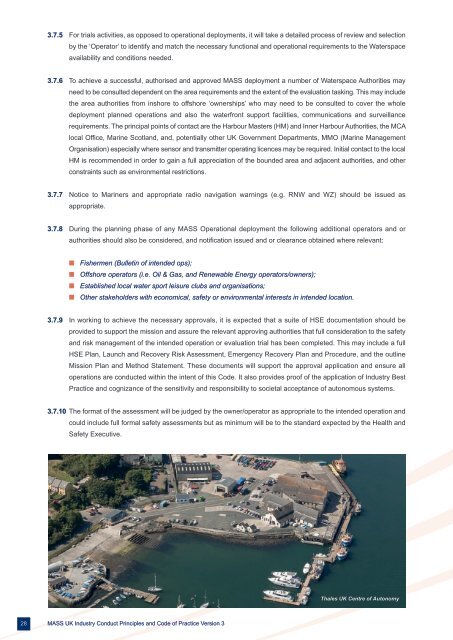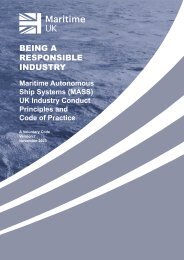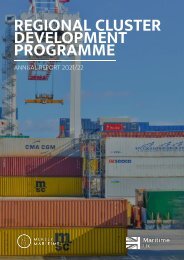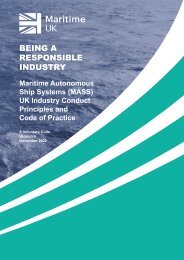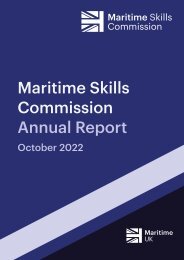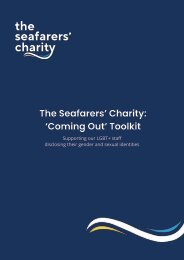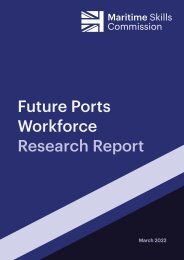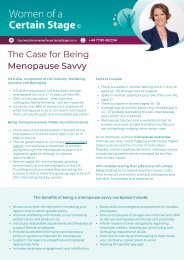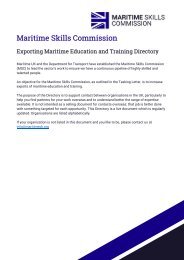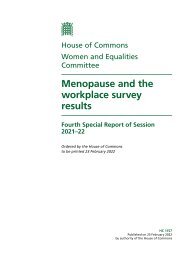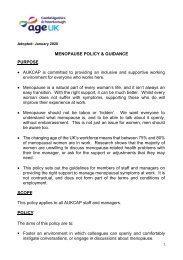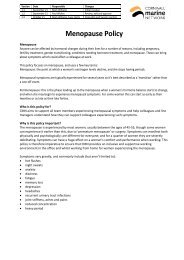code_of_practice_V3_2019
You also want an ePaper? Increase the reach of your titles
YUMPU automatically turns print PDFs into web optimized ePapers that Google loves.
3.7.5 For trials activities, as opposed to operational deployments, it will take a detailed process <strong>of</strong> review and selection<br />
by the ‘Operator’ to identify and match the necessary functional and operational requirements to the Waterspace<br />
availability and conditions needed.<br />
3.7.6 To achieve a successful, authorised and approved MASS deployment a number <strong>of</strong> Waterspace Authorities may<br />
need to be consulted dependent on the area requirements and the extent <strong>of</strong> the evaluation tasking. This may include<br />
the area authorities from inshore to <strong>of</strong>fshore ‘ownerships’ who may need to be consulted to cover the whole<br />
deployment planned operations and also the waterfront support facilities, communications and surveillance<br />
requirements. The principal points <strong>of</strong> contact are the Harbour Masters (HM) and Inner Harbour Authorities, the MCA<br />
local Office, Marine Scotland, and, potentially other UK Government Departments, MMO (Marine Management<br />
Organisation) especially where sensor and transmitter operating licences may be required. Initial contact to the local<br />
HM is recommended in order to gain a full appreciation <strong>of</strong> the bounded area and adjacent authorities, and other<br />
constraints such as environmental restrictions.<br />
3.7.7 Notice to Mariners and appropriate radio navigation warnings (e.g. RNW and WZ) should be issued as<br />
appropriate.<br />
3.7.8 During the planning phase <strong>of</strong> any MASS Operational deployment the following additional operators and or<br />
authorities should also be considered, and notification issued and or clearance obtained where relevant:<br />
n Fishermen (Bulletin <strong>of</strong> intended ops);<br />
n Offshore operators (i.e. Oil & Gas, and Renewable Energy operators/owners);<br />
n Established local water sport leisure clubs and organisations;<br />
n Other stakeholders with economical, safety or environmental interests in intended location.<br />
3.7.9 In working to achieve the necessary approvals, it is expected that a suite <strong>of</strong> HSE documentation should be<br />
provided to support the mission and assure the relevant approving authorities that full consideration to the safety<br />
and risk management <strong>of</strong> the intended operation or evaluation trial has been completed. This may include a full<br />
HSE Plan, Launch and Recovery Risk Assessment, Emergency Recovery Plan and Procedure, and the outline<br />
Mission Plan and Method Statement. These documents will support the approval application and ensure all<br />
operations are conducted within the intent <strong>of</strong> this Code. It also provides pro<strong>of</strong> <strong>of</strong> the application <strong>of</strong> Industry Best<br />
Practice and cognizance <strong>of</strong> the sensitivity and responsibility to societal acceptance <strong>of</strong> autonomous systems.<br />
3.7.10 The format <strong>of</strong> the assessment will be judged by the owner/operator as appropriate to the intended operation and<br />
could include full formal safety assessments but as minimum will be to the standard expected by the Health and<br />
Safety Executive.<br />
Thales UK Centre <strong>of</strong> Autonomy<br />
28<br />
MASS UK Industry Conduct Principles and Code <strong>of</strong> Practice Version 3


